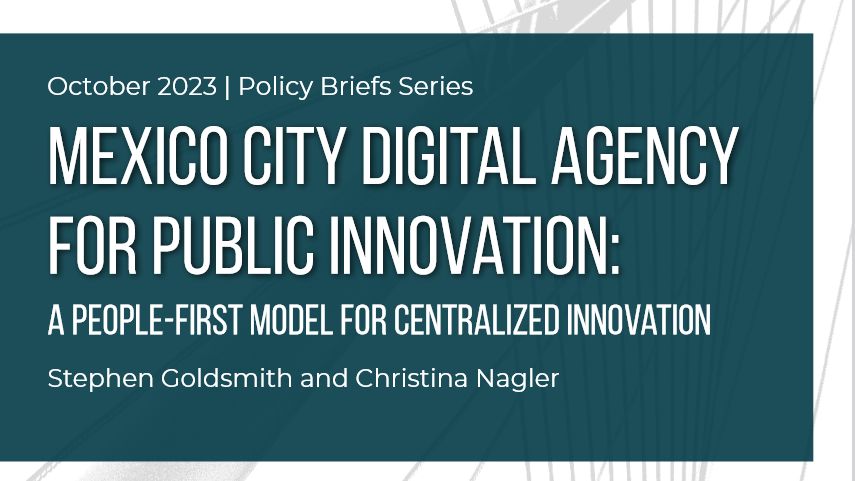- January 17, 2014
- Civic Data
Edward Snowden’s leaks of classified documents continue to reverberate through federal policy and politics, and have been the subject of countless cable news debates, newspaper columns, and blog posts. Obama’s announcement today of NSA reforms is merely the latest chapter in the ongoing saga. Less discussed, however, are the incident’s repercussions for data-smart cities.
It’s not an easy subject. After all, Snowden’s revelations about NSA surveillance inspired an unusual bipartisan coalition of public officials to express concern about the federal government’s intrusions in the name of national security. The issue defies easy categorization or policy response on a national level, and so it might seem at the local level as well.
What does the incident mean for cities working to provide public access to information and improve services through data analytics? Can innovative mayors and administrators still move forward with ambitious plans to employ the data at their disposal while simultaneously reassuring the public of its safety?
Fortunately for those municipal leaders who may be wringing their hands about privacy concerns, cities looking to bring service provision into the digital age are perfectly positioned to harness Big Data without raising the specter of Big Brother.
Cities face two main advantages that make data analytics a much less risky prospect at an urban level than at a federal level.
1) Accountability
The country’s federalist ideals themselves render cities well suited to harness the potential of Big Data. For many Americans across the political spectrum, the idea of federal agencies rooting through private data conjures images of an omniscient government monolith amassing power; in contrast, city councils and mayors eager to improve city services are more likely to inspire warm feelings of democracy at work. The literal and figurative proximity of municipal officials to voters renders them less intimidating and engenders confidence that they will likely be more cautious with resident privacy. And if not, local authorities can far more easily be removed from office than a distant federal official.
By design and geographic necessity, municipal governments are inherently more accessible to residents than state or federal governments, and thus more sensitive to their opinions and needs. The happy consequence of this is that city governments are less threatening, and as a result city public servants are more able to dispel fears of abuse of resident data.
2) Tangible Results and Transparency
Big Data efforts on a city level avoid an intrinsic tension that exists in NSA surveillance. Due to national security concerns, the public is in the dark about what precisely occurs under the auspices of the Agency. Scrutiny of the process is difficult, and often impossible, by design.
The tasks to which data analytics are being applied on a metropolitan level, however, produce tangible, and visible, results. Whether through efforts to determine exactly which properties present the greatest fire risk or reduce a city’s rat population, cities can point to physical results; constituents can look around their neighborhood and see what has changed.
As city governments proceed with efforts to apply data analytics to increasing efficiency and targeting city services, they must be sure to point to the results of their efforts, informing their constituents of the benefits of these programs. The Boston Mayor’s Office of Urban Mechanics, for instance, is intentionally accessible in presenting each of its initiatives to the public. Cities can, and should, be aggressively transparent in communicating their Big Data efforts to the public.
Data-smart cities are in effect the polar opposite of the NSA’s operations: rather than running a black box operation, they are more akin to a glass house revealing to the public exactly what is being done and why. Clandestine activities would be a sign of corruption or malfeasance, and undermine responsible governance. Residents understand the full scope of what is being implemented by their elected officials, allowing their educated consent or disagreement.
A Virtuous Cycle
These two advantages can produce a beautiful positive feedback loop in city efforts to harness data analytics. As a result of the accountable and tangible nature of city government efforts, transparency is easily enhanced on a metropolitan level: carefully targeted publicity campaigns and public education efforts make communities and neighborhoods aware of the precise effects of Big Data programs. The public can be informed precisely how these policies affect their utility bills, their children's educations, or their morning commutes. The relative ease of communication between local government and residents allows cities to heavily publicize their Big Data successes, providing a further (political) incentive for city leaders to utilize data analytics.
Public trust will be dramatically enhanced if these data analytics efforts are in fact successful, so it is essential that city governments follow best practices in their efforts. Various organizations have recently produced guides for those cities considering open data initiatives, and such advice should be heeded closely, as should examples of similar efforts from cities like New York or Boston.
Success in implementing these Big Data programs, combined with intentional efforts to maintain transparency and accountability means that city governments can manage to have their cake and eat it too: they can use data analytics to improve public services without inflaming public concern that the programs will overly burden individual privacy.

 Nick Carney is a Masters in Public Policy candidate at the Harvard Kennedy School of Government and a Public Service Fellow. He is concentrating in Social and Urban Policy and has previously worked in clean energy policy and mixed-use, urban real estate development. Nick is particularly fascinated by transportation, land-use, and education policy, and with his sister runs a literacy nonprofit called Breaking the Chain.
Nick Carney is a Masters in Public Policy candidate at the Harvard Kennedy School of Government and a Public Service Fellow. He is concentrating in Social and Urban Policy and has previously worked in clean energy policy and mixed-use, urban real estate development. Nick is particularly fascinated by transportation, land-use, and education policy, and with his sister runs a literacy nonprofit called Breaking the Chain.


